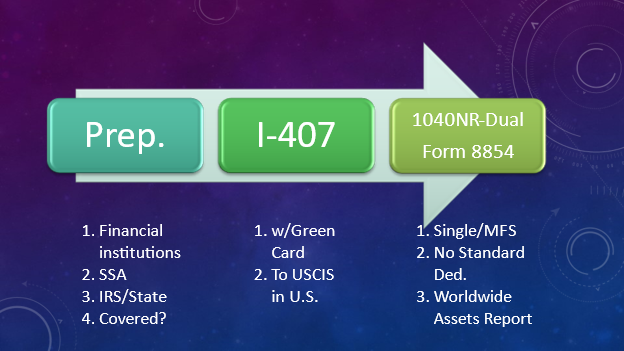Supports Cross Border Professionals and Families

This article will explain the three critical steps in abandoning a green card for U.S. tax purposes.
- Preparation Step
Preparation is the most critical step in abandoning a Green Card. You need to ensure that your U.S. financial institutions can maintain your financial accounts even after you give up your Green Card. You may get confused because you may receive different responses. You need to be patient until you get the correct response. Please also be aware that a financial institution can change its policy. Once you find out that you cannot maintain your accounts, you must take action before leaving the U.S.
You also want to set up your My Social Security Account on the SSA’s website. It is because even after you leave the U.S., you want to check your social security information online. Once you lose your U.S. address, I do not think you can set up an account. This step is a must-do step before you leave.
You also want to notify the IRS and the state tax authority of your permanent address change using the form they specify. This action is necessary to ensure you receive essential notices from the tax authorities to avoid late penalties.
Finally, you want to ensure you will not be a covered expatriate when you abandon your green card. It is often too late to plan if you discover you became a covered expatriate after the fact. At least a few years of planning is necessary.
- Submission of I-407 (Record of Abandonment of Lawful Permanent Resident Status)
After permanently leaving the U.S., the next step is to submit I-407 to USCIS (U.S. Citizenship and Immigration Services). The form is downloadable from the website and relatively easy to fill out. You must enclose your original green card and other documents, such as a re-entry reentry permit. We recommend that our clients take photocopies of the filled-out form and the green card. Also, we advise our clients to use delivery services with tracking capabilities. On the website, there are two addresses listed. Since most individuals send the form overseas, they should use the second address listed (i.e., FedEx, UPS, DHL, or other express/registered deliveries).
We recommend our clients consult with an immigration attorney if they are unsure about the form or have any questions or concerns.
The timing of this submission often determines the last day as a U.S. resident for tax purposes. To avoid double taxation, you are advised to file I-407 as soon as possible.
In addition, many will file W-8BEN (Certificate of Foreign Status of Beneficial Owner for United States Tax Withholding and Reporting (individuals).
- 1040 Dual Status and Form 8854
You must file your final U.S. tax returns called Form 1040 NR-Dual Status the following year. The due date is the same as your Form 1040 (i.e., April 15 each year.) The author is not sure if you can file the 2023 form electronically. The I.R.S. did not allow electronic filing of this form until 2022. If you have held your green card for over eight years, you must also file Form 8854 (Initial and Annual Expatriation Statement). I believe that this form cannot be electronically filed.
Even if a married couple abandons green cards together, they cannot file the tax returns as married filing jointly. Each spouse must file 1040 NR-Dual as a separate person. In addition, you cannot take a standard deduction. Your only choice is to take itemized deductions.
Finally, on Form 8854, each taxpayer must list his/her worldwide—assets and liabilities as of the day before abandoning a green card. You will be classified as a covered expatriate if the net assets exceed $2 million. Unless you file Form 8854, your abandonment of your green card for tax purposes is not completed. Including Form 8854 as a part of your tax filing is critical.
CDH provides tax return preparation and tax consulting services for Cross-Border individuals living in the United States or foreign countries and strives daily to solve and explain various problems and questions of these people. In addition, the issues these people face are complex and wide-ranging, including the tax laws of your country and the United States, immigration law, life insurance, and retirement rules. This article makes complex tax laws and regulations easy to understand, which is just the point. Therefore, there are many exceptions. There is also a risk that the rules have already changed by reading them. Don’t hesitate to contact us from the following website for the latest practices. Also, consult with tax and legal affairs experts if you take action.
CDH Resources: www.cdhcpa.com. We provide one-hour paid consultation sessions online. https://outlook.office365.com/owa/calendar/[email protected]/bookings/ If you can read Japanese, visit https://www.cdhcpa.com/ja/cross-border-individual-tax/. You can access them all on the page. YouTube, Facebook, free online consultations, estate, permanent resident waiver, exit tax, Form 1040, tax simulation, overseas asset reporting, other sectoral online question forms, and monthly newsletter sign-ups. For more information-packed past articles, check out https://www.cdhcpa.com/ja/news/. Please feel free to use it. You can email me at [email protected]
